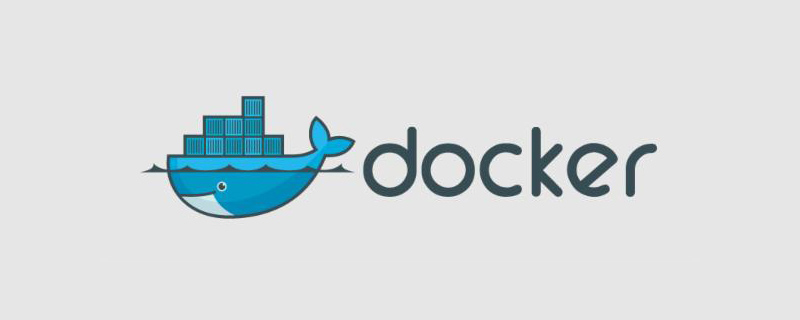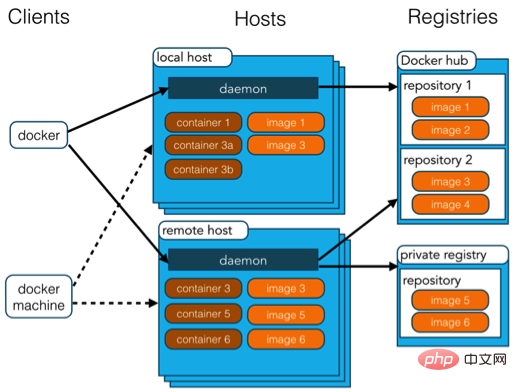Quickly understand the Docker architecture

Docker includes three basic concepts:
Image: Docker image (Image) is equivalent to a root file system. For example, the official image ubuntu:16.04 contains a complete set of the root file system of the Ubuntu16.04 minimal system.
Container (Container): The relationship between image (Image) and container (Container) is just like the classes and instances in object-oriented programming. The image is a static definition, and the container Is the entity when the image is running. Containers can be created, started, stopped, deleted, paused, etc.
Warehouse (Repository): The warehouse can be regarded as a code control center, used to save images.
Docker uses a client-server (C/S) architecture model and uses remote APIs to manage and create Docker containers.
Docker containers are created through Docker images.
The relationship between containers and images is similar to objects and classes in object-oriented programming.
| docker | Object-oriented |
| Container | Object |
| Mirror | Class |

| Description | |
| Docker image (Images) | Docker image is a template for creating Docker containers, such as Ubuntu system. |
| Docker Container(Container) | A container is an application or a group of applications that runs independently and is a mirror runtime entity. |
| Docker Client (Client) | Docker client uses the Docker SDK (https ://docs.docker.com/develop/sdk/) communicates with the Docker daemon. |
| Docker Host (Host) | A physical or virtual machine used to execute the Docker daemon and containers. |
| Docker Registry | Docker warehouse is used to save images and can be understood as a code warehouse in code control. Docker Hub (https://hub.docker.com) provides a huge collection of images for use. A Docker Registry can contain multiple repositories (Repositories); each repository can contain multiple tags (Tag); each tag corresponds to an image. Usually, a warehouse will contain images of different versions of the same software, and tags are often used to correspond to each version of the software. We can specify which version of this software is the image through the format of |
| Docker Machine | Docker Machine is a command line tool that simplifies Docker installation through a simple command line You can install Docker on the corresponding platform, such as VirtualBox, Digital Ocean, and Microsoft Azure. |
Docker"
The above is the detailed content of Quickly understand the Docker architecture. For more information, please follow other related articles on the PHP Chinese website!

Hot AI Tools

Undresser.AI Undress
AI-powered app for creating realistic nude photos

AI Clothes Remover
Online AI tool for removing clothes from photos.

Undress AI Tool
Undress images for free

Clothoff.io
AI clothes remover

Video Face Swap
Swap faces in any video effortlessly with our completely free AI face swap tool!

Hot Article

Hot Tools

Notepad++7.3.1
Easy-to-use and free code editor

SublimeText3 Chinese version
Chinese version, very easy to use

Zend Studio 13.0.1
Powerful PHP integrated development environment

Dreamweaver CS6
Visual web development tools

SublimeText3 Mac version
God-level code editing software (SublimeText3)

Hot Topics
 1389
1389
 52
52
 How to update the image of docker
Apr 15, 2025 pm 12:03 PM
How to update the image of docker
Apr 15, 2025 pm 12:03 PM
The steps to update a Docker image are as follows: Pull the latest image tag New image Delete the old image for a specific tag (optional) Restart the container (if needed)
 How to copy files in docker to outside
Apr 15, 2025 pm 12:12 PM
How to copy files in docker to outside
Apr 15, 2025 pm 12:12 PM
Methods for copying files to external hosts in Docker: Use the docker cp command: Execute docker cp [Options] <Container Path> <Host Path>. Using data volumes: Create a directory on the host, and use the -v parameter to mount the directory into the container when creating the container to achieve bidirectional file synchronization.
 How to exit the container by docker
Apr 15, 2025 pm 12:15 PM
How to exit the container by docker
Apr 15, 2025 pm 12:15 PM
Four ways to exit Docker container: Use Ctrl D in the container terminal Enter exit command in the container terminal Use docker stop <container_name> Command Use docker kill <container_name> command in the host terminal (force exit)
 How to restart docker
Apr 15, 2025 pm 12:06 PM
How to restart docker
Apr 15, 2025 pm 12:06 PM
How to restart the Docker container: get the container ID (docker ps); stop the container (docker stop <container_id>); start the container (docker start <container_id>); verify that the restart is successful (docker ps). Other methods: Docker Compose (docker-compose restart) or Docker API (see Docker documentation).
 How to use docker desktop
Apr 15, 2025 am 11:45 AM
How to use docker desktop
Apr 15, 2025 am 11:45 AM
How to use Docker Desktop? Docker Desktop is a tool for running Docker containers on local machines. The steps to use include: 1. Install Docker Desktop; 2. Start Docker Desktop; 3. Create Docker image (using Dockerfile); 4. Build Docker image (using docker build); 5. Run Docker container (using docker run).
 How to view the docker process
Apr 15, 2025 am 11:48 AM
How to view the docker process
Apr 15, 2025 am 11:48 AM
Docker process viewing method: 1. Docker CLI command: docker ps; 2. Systemd CLI command: systemctl status docker; 3. Docker Compose CLI command: docker-compose ps; 4. Process Explorer (Windows); 5. /proc directory (Linux).
 What to do if the docker image fails
Apr 15, 2025 am 11:21 AM
What to do if the docker image fails
Apr 15, 2025 am 11:21 AM
Troubleshooting steps for failed Docker image build: Check Dockerfile syntax and dependency version. Check if the build context contains the required source code and dependencies. View the build log for error details. Use the --target option to build a hierarchical phase to identify failure points. Make sure to use the latest version of Docker engine. Build the image with --t [image-name]:debug mode to debug the problem. Check disk space and make sure it is sufficient. Disable SELinux to prevent interference with the build process. Ask community platforms for help, provide Dockerfiles and build log descriptions for more specific suggestions.
 How to start mysql by docker
Apr 15, 2025 pm 12:09 PM
How to start mysql by docker
Apr 15, 2025 pm 12:09 PM
The process of starting MySQL in Docker consists of the following steps: Pull the MySQL image to create and start the container, set the root user password, and map the port verification connection Create the database and the user grants all permissions to the database




